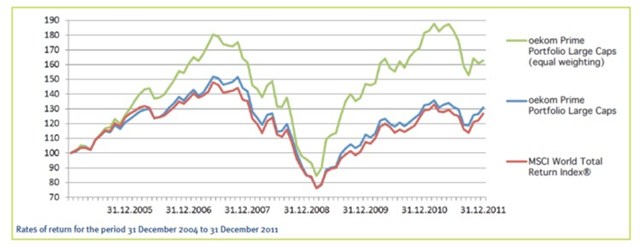Sustainable investments yield better returns - big time!
 Over the period from 31 December 2004 to 31 December 2011, the return on investment yielded by companies that oekom research has evaluated positively in terms of sustainability was more than 15 per cent above that of the MSCI World Total Return Index(r). At the same time, these companies presented a slightly lower risk than the conventional benchmark.
Over the period from 31 December 2004 to 31 December 2011, the return on investment yielded by companies that oekom research has evaluated positively in terms of sustainability was more than 15 per cent above that of the MSCI World Total Return Index(r). At the same time, these companies presented a slightly lower risk than the conventional benchmark.Underlying this is the belief that the use of exclusion criteria and a best-in-class approach, whereby only the most sustainable companies in an industry are invested in, will lead to a reduction in the size of the investable universe and consequently, according to current portfolio theories, to disadvantages in terms of return and risk.
Sustainable investors, on the other hand, are convinced that companies which act in a socially and environmentally responsible way, for example by aspiring to be energy- and resource-efficient, by treating their employees and suppliers fairly and by adhering to principles of good governance, will be economically successful.
The aim of the study, which was carried out jointly by oekom research and DPG, was to examine these plausibility considerations statistically. For this purpose, a portfolio of major companies rated positively in terms of sustainability criteria (“oekom Prime Portfolio Large Caps”) was compared with the MSCI World Total Return Index(r).
During the period from 31 December 2004 to 31 December 2011, i.e. over a period of seven years, oekom’s Prime Portfolio Large Caps, weighted by market capitalisation, achieved a cumulative return on investment of 30.90 per cent.
Over the same period, the cumulative return on investment for the MSCI World(r) came to 26.80 per cent. “During the period looked at, the oekom Prime Portfolio Large Caps thus achieved a return on investment that was 4.1 percentage points - or 15.30 per cent - higher,” says Hans G. Pieper, Managing Director of DPG.
The top performers during the period 31 December 2004 to 31 December 2011 were oekom Prime Portfolio Large Caps securities from the Asia-Pacific region. Weighted by market capitalisation, they achieved an annual rate of return of 6.39 per cent, performing significantly better than the comparison index, which achieved 4.86 per cent p.a.
In Germany, likewise, the annual rate of return during the period looked at stood at 5.36 per cent, putting it above that of the corresponding benchmark (4.26 per cent). In Europe, oekom’s Prime Portfolio Large Caps achieved the same annual rate of return (2.89 per cent) as the corresponding MSCI Index(r).
“The results of the study confirm our hypothesis that sustainability performance is a good indicator of companies’ overall performance and that investors would be well advised to incorporate this indicator into their decision-making processes,” says Robert Haßler, CEO of oekom research.
He goes on to say, “The superior performance was not achieved at the cost of higher risk; on the contrary, the annual risk of oekom’s Prime Portfolio Large Caps was actually slightly lower than that of the MSCI World Index(r).”
In terms of annual risk, oekom’s Prime Portfolio Large Caps achieved a figure of 18.92 per cent, compared with the MSCI World(r)’s 19.08 per cent.

The analysis was based on a portfolio of major companies that had been awarded Prime Status by oekom research. Prime Status is awarded to companies which satisfy industry-specific sustainability management requirements defined by oekom research. As at 31 December 2011, oekom’s Prime Portfolio Large Caps comprised 300 companies from more than 25 countries.
You can return to the main Market News page, or press the Back button on your browser.

